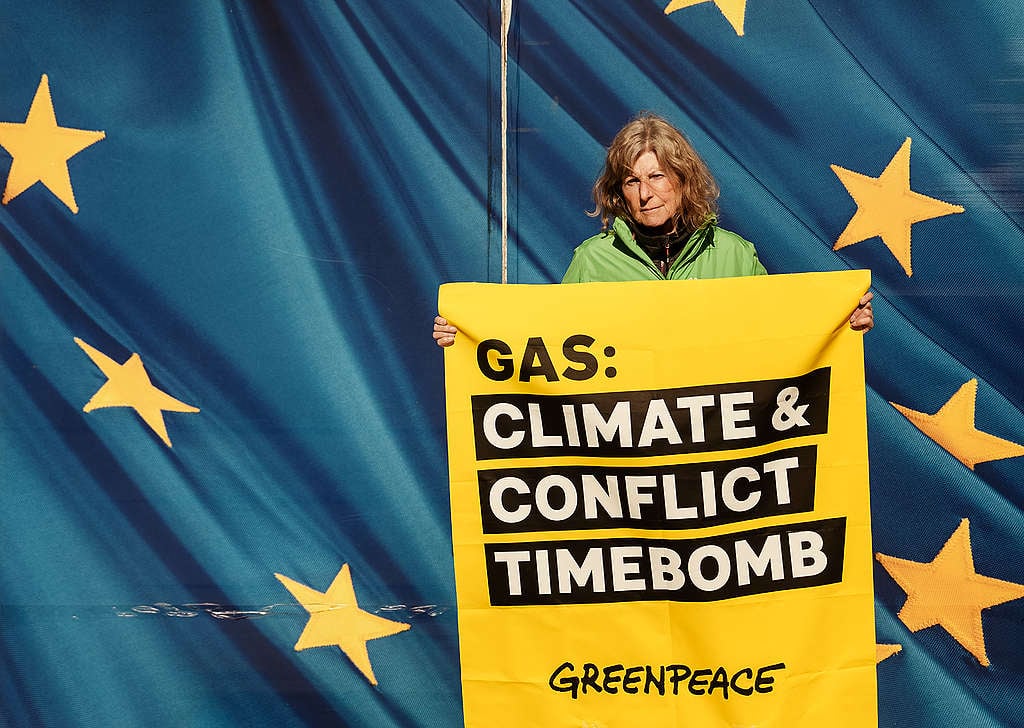Brussels – The Commission’s list of Projects of Common Interest (PCI) includes a number of projects that, under the pretence of facilitating the development of hydrogen technology, risk being just a way to keep gas operators afloat with EU funding, while combining the threats of the climate crisis and armed conflicts – said Greenpeace.

Commenting on the published PCI list, Silvia Pastorelli, Greenpeace EU climate and energy campaigner, said: “Gas companies propose a vague future where gas infrastructure could be used to transport hydrogen – and the Commission falls for it. But the technical and economic viability of transporting hydrogen through such pipelines is questionable at best, and there are no concrete plans to generate the requisite quantities of “green” hydrogen from renewables. The EU’s continued backing of fossil fuels is not only a climate disaster, it’s a genuine threat to peace: new gas infrastructure is no route to energy security.”
The list also grants priority status to a number of carbon capture and storage projects (CCS), which have more than doubled compared to the previous list. The EU is banking on this technology to reach its climate neutrality targets, but environmental NGOs continue to warn of the risks of relying on such a costly and ineffective technology whose history has been described as “largely one of underperformance” by the International Energy Agency.
The list of projects includes the controversial H2Med hydrogen project and EastMed gas pipeline, the latter having obtained an exemption through the latest review of the TEN-E regulation.The pipeline, which would not come online before 2028, is planned to connect Israeli gas fields with Greece passing through contested waters between Greece, Turkey and Cyprus and, possibly, branching off to Italy.
A recent report by Greenpeace Italy warned that the EastMed pipeline is a climate and conflict timebomb:
- By passing through contested maritime borders between Greece, Turkey and the divided island of Cyprus, the EastMed pipeline would increase the risk of armed conflict in what is already a highly militarised region.
- If it is built, the EastMed pipeline could be responsible for greenhouse gas emissions equivalent to 27 million tonnes of CO2 every year, taking into account energy consumption, transport and leakage.
- The pipeline could also become an obvious military target, as demonstrated by the 2022 attacks on the NordStream pipeline between Russia and Germany.
Following the PCI publication, EU governments and the European Parliament will have two months to endorse or reject the list as a whole, but cannot make any changes to the list itself or reject individual projects.
Contacts:
Silvia Pastorelli, Greenpeace EU climate and energy campaigner: +32 496 12 20 94, [email protected]
Greenpeace EU press desk: +32 (0)2 274 1911, [email protected]
For breaking news and comment on EU affairs: www.twitter.com/GreenpeaceEU
Greenpeace is an independent global campaigning network that acts to change attitudes and behaviour, to protect and conserve the environment and to promote peace. We do not accept donations from governments, the EU, businesses or political parties. Greenpeace has over three million supporters, and 26 independent national and regional organisations with offices in more than 55 countries.
EU Transparency Register: 9832909575-41
